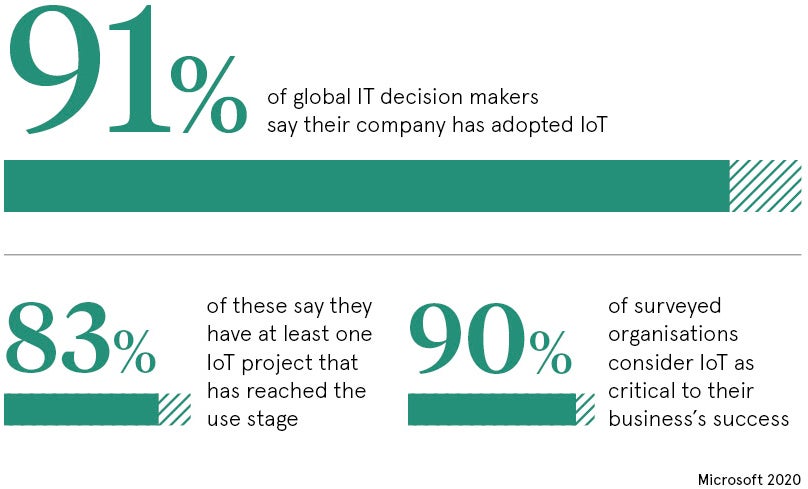
If you don’t already know the benefits of the internet of things (IoT) for business then it’s high time you found out because your competitors already will. IoT is a key element of the Fourth Industrial Revolution, often referred to as Industry 4.0, and as we end 2020, it is clear the landscape has changed so much in a year.
According to Microsoft’s 2020 IoT Signals report, 91 per cent of the global IoT decision-makers researchers spoke to have adopted IoT in 2020, up from 85 per cent last year. Nine in ten believe IoT is critical to their company’s continued success and 64 per cent plan to implement it even more in the future.
The impact of coronavirus has been stark in propelling the industry forward, some say by years, with one in three (31 per cent) stating their organisations will increase investment in IoT due to the pandemic, twice the number that will decrease it. A further 41 per cent will maintain the same commitment.
So, what exactly are the benefits of IoT for business? They are numerous, largely due to its ability to collect, analyse and send data in seconds. Outcomes range from the ability to enhance productivity and production through automation, to using networks of interconnected sensors for greater visibility, clarity and security of the supply chain.
All industries can, and will, benefit but it is within healthcare and manufacturing that IoT came into its own this year. Smart tracking and connected devices helped employees keep their distance, while remote monitoring of machinery was used frequently when staff were unable to be on site due to factory closures.
Colin Crow, managing director of digital transformation specialist Sigma Dynamics, says: “IoT technology has been used to reduce the risk to employees while also ensuring productivity and efficiency remain as high as possible, crucial in the current economic climate.”
Global IoT models increasing productivity
According to the Microsoft report, France, Germany, China and the United States have the highest percentages of IoT adopters currently; 83 per cent of adopters have at least one project that has reached the use stage, up from 74 per cent last year.
It is cited as being instrumental in increasing yield, with nearly half (46 per cent) reporting increased production capacity and 44 per cent signalling cost-savings. Quality and safety were other named benefits of IoT for business.
However, according to The Future in 2020 survey from BT: “UK plc risks falling behind other developed nations because companies are not embracing transformational technologies.” The survey of 1,000 business leaders found just one in five said IoT existed within their organisation.
There does seem to be a divide, however, because among large businesses this was 28 per cent, perhaps demonstrating small and medium-sized enterprises lag behind when it comes to seeing the benefits of IoT. Nonetheless, just 19 per cent of respondents overall believed IoT technologies would be critical in the next five years in enabling their business to achieve its ambitions and stay competitive.
For Martin Garner, chief operations officer at CCS Insight, identifying these comes down to focusing on the business outcomes of IoT first and developing a strategy based on that. He says: “It is essential to focus on business outcomes with IoT. No one buys ‘IoT’. Instead they buy a system that helps them improve, optimise or change some part of their business. IoT is just a part of the system, which helps to collect the right data.
“Although IoT systems can involve lots of different data types, brought together in quite a complicated system architecture, the system will be of no use if it’s not usable by people in the business doing their daily jobs. It is essential to keep a focus on the user, their workflows, the way data is presented to them, how they make decisions using that data, whether those decisions can be automated and how outcomes of the decisions are fed back into the system.”

IoT development and solutions are a smart investment
With the benefits of IoT for business now felt across industries as wide and varied as automotive to building management, retail to mining and shipping to utilities, investment in these technologies looks likely to soar.
Daniel Bailey, investment manager at ECI Partners, a private equity firm, says: “The market for IoT is exciting. It’s large and growing rapidly, driven by reducing data costs, improving underlying technologies, such as 5G, and the ever-increasing viable use-cases for connecting ‘things’. The benefits of this to businesses are far reaching, anything from ensuring construction regulations are complied with to tracking cows across a farm.”
A new global study from Juniper Research also signals a bright future with the number of industrial IoT connections predicted to increase from 17.7 billion in 2020 to 36.8 billion in 2025, fuelled by smart manufacturing.
However looking ahead to 2021, Paul Haimes, vice president of European technical sales at industrial IoT platform PTC, says: “If I hope for one thing it is that these adoptions of technologies have a better uptake in the small and medium-sized business space. That’s really important for the recovery and health of our manufacturing industry.”
And he adds something all leaders may wish to consider: “IoT, augmented reality, blockchain or cloud, whatever it might be, all can offer a solution to the typical challenges facing businesses. The core starting point is the business plan. What are you trying to do, what does your company need to do and then how can digital technologies impact and support this?”

If you don't already know the benefits of the internet of things (IoT) for business then it's high time you found out because your competitors already will. IoT is a key element of the Fourth Industrial Revolution, often referred to as Industry 4.0, and as we end 2020, it is clear the landscape has changed so much in a year.
According to Microsoft's 2020 IoT Signals report, 91 per cent of the global IoT decision-makers researchers spoke to have adopted IoT in 2020, up from 85 per cent last year. Nine in ten believe IoT is critical to their company's continued success and 64 per cent plan to implement it even more in the future.
The impact of coronavirus has been stark in propelling the industry forward, some say by years, with one in three (31 per cent) stating their organisations will increase investment in IoT due to the pandemic, twice the number that will decrease it. A further 41 per cent will maintain the same commitment.
